
One of the government’s justifications for its new bout of manufacturing protectionism is that everyone else is doing it — not necessarily the best logic for committing billions of dollars to prop up an industry where Australia lacks anything in the way of comparative advantage.
It’s true — the Americans have the Inflation Reduction Act and CHIPS Act and the Europeans have their own CHIPS legislation. The UK government in December announced a £4.5 billion “Advanced Manufacturing Plan” that hits exactly the same notes as the Albanese government’s — “strategic manufacturing”, “building supply chain resilience”, “cutting edge technology and driving our transition to net zero” etc etc.
The Canadians went further last year — the Trudeau government dubbed its entire 2023 budget “A Made-in-Canada Plan” with “targeted investments and programming” in areas like “clean manufacturing”, “critical minerals” and “electric vehicles and batteries”.
Then there’s the French. In many ways, everyone is playing catch up with Emmanuel Macron, who from the start of his first campaign to win the French presidency promised an “industrial reconquest” of areas that had endured the decline of French manufacturing. Macron’s goal was partly political — to head off the sort of economic alienation that was driving working class French voters to the right. “When a factory closes, you see the opening of an office of the [far right] Rassemblement National because people feel neglected, despised,” Macron’s long-term Finance Minister Bruno Le Maire has said.
Le Maire has committed to increase the manufacturing share of France’s GDP from 10.5% to 15%. So far, Macron and Le Maire have had some success — creating 130,000 new manufacturing jobs.
Except there’s a problem. Le Maire commissioned an industry policy expert and adviser to former president François Hollande, Olivier Lluansi, to assess how to achieve what would be an astonishing increase in the size of French manufacturing. According to Le Monde, Lluansi warned “while waiting for new nuclear power plants to come on stream, France will not have enough decarbonised energy to gain five GDP points in 10 years, nor will it have enough trained manpower.”
The best France could do was a 2-3% increase — and even that would be “remarkable”.
Traditionally, the idea that France wouldn’t have a big enough workforce would have seemed absurd. For much of the past 30 years, and particularly after the financial crisis, French unemployment was stuck above 9%, and routinely above 10% in the early part of last decade. But under Macron, it’s fallen from above 9% when he was elected in 2017 to around 7.3% now. France’s defence manufacturing sector is already plagued by serious skill shortages. Labour markets have been especially tight since the pandemic. Despite a slowing economy due to interest rate rises and the energy price shock, the European Union found worker shortages right across the EU had reached record levels in 2023. That’s unlikely to be helped by pressure from the right in France for stricter migration controls.
So France can’t find enough workers for industries like defence manufacturing, construction and agriculture — a latter sector already heavily reliant on foreign labour, and about to get a whole lot more so as French farmers get older.
Australia has similar pressure coming from the right for migration controls, but a more acute worker shortage problem, given unemployment is still below 4% despite the best efforts of the Reserve Bank. The government yesterday announced it was pumping another $100 million into construction and skills training in a desperate effort to remedy a serious workforce shortage in construction that’s plaguing both residential construction and major civil engineering projects alike.
Strange that we’re devoting billions to trying to build whole new manufacturing sectors from the ground up at the same time as we’re trying to fix worker shortages in industries we actually need. And good luck trying to import manufacturing workers from Europe.







